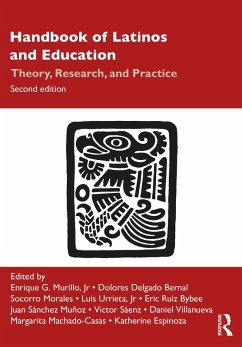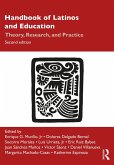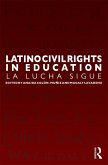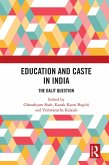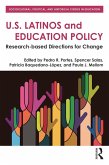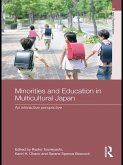Handbook of Latinos and Education (eBook, PDF)
Theory, Research, and Practice
Redaktion: Murillo Jr, Enrique G.; Machado-Casas, Margarita; Villanueva, Daniel; Saenz, Victor B.; Muñoz, Juan Sánchez; Ruiz Bybee, Eric; Urrieta Jr, Luis; Morales, Socorro; Delgado Bernal, Dolores; Espinoza, Katherine
110,95 €
110,95 €
inkl. MwSt.
Sofort per Download lieferbar

55 °P sammeln
110,95 €
Als Download kaufen

110,95 €
inkl. MwSt.
Sofort per Download lieferbar

55 °P sammeln
Jetzt verschenken
Alle Infos zum eBook verschenken
110,95 €
inkl. MwSt.
Sofort per Download lieferbar
Alle Infos zum eBook verschenken

55 °P sammeln
Handbook of Latinos and Education (eBook, PDF)
Theory, Research, and Practice
Redaktion: Murillo Jr, Enrique G.; Machado-Casas, Margarita; Villanueva, Daniel; Saenz, Victor B.; Muñoz, Juan Sánchez; Ruiz Bybee, Eric; Urrieta Jr, Luis; Morales, Socorro; Delgado Bernal, Dolores; Espinoza, Katherine
- Format: PDF
- Merkliste
- Auf die Merkliste
- Bewerten Bewerten
- Teilen
- Produkt teilen
- Produkterinnerung
- Produkterinnerung

Bitte loggen Sie sich zunächst in Ihr Kundenkonto ein oder registrieren Sie sich bei
bücher.de, um das eBook-Abo tolino select nutzen zu können.
Hier können Sie sich einloggen
Hier können Sie sich einloggen
Sie sind bereits eingeloggt. Klicken Sie auf 2. tolino select Abo, um fortzufahren.

Bitte loggen Sie sich zunächst in Ihr Kundenkonto ein oder registrieren Sie sich bei bücher.de, um das eBook-Abo tolino select nutzen zu können.
Now in its second edition, this handbook offers a comprehensive review of rigorous, innovative, and critical scholarship profiling the scope and terrain of academic inquiry on Latinos and education.
- Geräte: PC
- ohne Kopierschutz
- eBook Hilfe
- Größe: 5.34MB
Andere Kunden interessierten sich auch für
![Black Women Navigating the Doctoral Journey (eBook, PDF) Black Women Navigating the Doctoral Journey (eBook, PDF)]() Black Women Navigating the Doctoral Journey (eBook, PDF)26,95 €
Black Women Navigating the Doctoral Journey (eBook, PDF)26,95 €![Handbook of Latinos and Education (eBook, ePUB) Handbook of Latinos and Education (eBook, ePUB)]() Handbook of Latinos and Education (eBook, ePUB)110,95 €
Handbook of Latinos and Education (eBook, ePUB)110,95 €![Latino Civil Rights in Education (eBook, PDF) Latino Civil Rights in Education (eBook, PDF)]() Latino Civil Rights in Education (eBook, PDF)49,95 €
Latino Civil Rights in Education (eBook, PDF)49,95 €![Education and Caste in India (eBook, PDF) Education and Caste in India (eBook, PDF)]() Education and Caste in India (eBook, PDF)44,95 €
Education and Caste in India (eBook, PDF)44,95 €![U.S. Latinos and Education Policy (eBook, PDF) U.S. Latinos and Education Policy (eBook, PDF)]() U.S. Latinos and Education Policy (eBook, PDF)51,95 €
U.S. Latinos and Education Policy (eBook, PDF)51,95 €![Latinos and Education in the time of COVID-19 (eBook, PDF) Latinos and Education in the time of COVID-19 (eBook, PDF)]() Latinos and Education in the time of COVID-19 (eBook, PDF)52,95 €
Latinos and Education in the time of COVID-19 (eBook, PDF)52,95 €![Minorities and Education in Multicultural Japan (eBook, PDF) Minorities and Education in Multicultural Japan (eBook, PDF)]() Minorities and Education in Multicultural Japan (eBook, PDF)47,95 €
Minorities and Education in Multicultural Japan (eBook, PDF)47,95 €-
-
-
Now in its second edition, this handbook offers a comprehensive review of rigorous, innovative, and critical scholarship profiling the scope and terrain of academic inquiry on Latinos and education.
Dieser Download kann aus rechtlichen Gründen nur mit Rechnungsadresse in A, B, BG, CY, CZ, D, DK, EW, E, FIN, F, GR, HR, H, IRL, I, LT, L, LR, M, NL, PL, P, R, S, SLO, SK ausgeliefert werden.
Produktdetails
- Produktdetails
- Verlag: Taylor & Francis eBooks
- Seitenzahl: 452
- Erscheinungstermin: 29. Juli 2021
- Englisch
- ISBN-13: 9781000399905
- Artikelnr.: 62054654
- Verlag: Taylor & Francis eBooks
- Seitenzahl: 452
- Erscheinungstermin: 29. Juli 2021
- Englisch
- ISBN-13: 9781000399905
- Artikelnr.: 62054654
- Herstellerkennzeichnung Die Herstellerinformationen sind derzeit nicht verfügbar.
EDITOR-IN-CHIEF Enrique G. Murillo, Jr. - California State University, San Bernardino, Enrique G. Murillo, Jr. is Professor of Education at California State University, San Bernardino. He is the founding editor in chief of the Journal of Latinos and Education (JLE) and of the inaugural edition of the Handbook of Latinos and Education (HLE). Additionally, he is the founder of the National Latino Education Network (NLEN) and Latino Education and Advocacy Days (LEAD), the objective of which is to promote a broad-based awareness of the crisis in Latino education and to enhance the intellectual, cultural, and personal development of the Latino community's educators, administrators, leaders, and students. SECTION I: History, Theory, and Methodology Dolores Delgado Bernal - California State University, Los Angeles Socorro Morales - The University of Texas at San Antonio Dolores Delgado Bernal is Chair and Professor in the Department of Chicana(o) and Latina(o) Studies at California State University, Los Angeles. Socorro Morales is an assistant professor in the Department of Educational Leadership and Policy Studies at the University of Texas at San Antonio. SECTION II: Policies and Politics Luis Urrieta, Jr. - The University of Texas at Austin Eric Ruiz Bybee - Brigham Young University Luis Urrieta, Jr. is the Suzanne B. and John L. Adams Endowed Professor of Education at the University of Texas at Austin. Eric Ruiz Bybee is an assistant professor at Brigham Young University. His research interests include Latinx education; bilingual teacher education; and identity, belonging, and cultural knowledge in education. SECTION III: Language and Culture Juan Sánchez Muñoz - University of California, Merced Victor Sáenz - The University of Texas at Austin Daniel Villanueva - University of Houston, Downtown Juan Sánchez Muñoz is the Chancellor of the University of California, Merced, and a former high school teacher, community college instructor, and university professor in education. Victor Sáenz is a professor in the College of Education at the University of Texas at Austin and is the chair of the Department of Educational Leadership and Policy. He holds courtesy appointments with the Center for Mexican American Studies and various other research centers across the University. Daniel Villanueva is a scholar-practitioner who serves as Vice President of Enrollment Management at the University of Houston, Downtown. His research interests include higher education administration, academic capitalism, student access, and Latinx issues. SECTION IV: Teaching and Learning Margarita Machado-Casas - San Diego State University Katherine Espinoza - Texas A&M University, San Antonio Margarita Machado-Casas is Chair and Full Professor in the Department of Dual Language and English Learner Education at San Diego State University. Her research interests include immigrant, Indigenous Afro-descendants, and bilingual/multilingual education, transnational communities, and minority agency. Katherine Espinoza is an assistant professor at Texas A&M University, San Antonio, whose research focus is Latina/o identity construction of students, and preservice and in-service teachers.
SECTION I: History, Theory and Methodology; 1: History, Theory, and
Methodology: An Introduction; 2: The United Status of Latinx: 2010-2020
Remix; 3: Radical Joteria-Muxerista Love in the Classroom: Brown Queer
Feminist Strategies for Social Transformation; 4: A Chicana/Latina Feminist
Methodology: Examining Pláticas in Educational Research; 5: Listening to
our Antepasados: Toward a Futurity of Chicanx/a/o and Puerto Rican Studies;
SECTION II: Policies and Politics; 6: Policies and Politics: An
Introduction ; 7: Latinx Faculty in la Academia: Power, Agency, and
Sobrevivencia; 8: Changing Faces and Persistent Patterns for Education in
the New Latino/a/x Diaspora; 9: Monoglossic Language Education Policies and
Latinx Students' Language; 10: Investing in Educational Equity for Latinos:
How Accountability, Access and Systemic Inequity Shape Opportunity; 11:
Como Una Jaula De Oro: How Policy Impacts Undocumented Latina/o College
Students; 12: Latina/o/x Teachers: History, Policies and Politics; 13:
Presencing While Absent: Indigenous Latinxs and Education; 14: Theorizing
AfroLatinx Subjectivities, Afrolatinidades, and the Racial Politics of
Identity in Education; SECTION III: Language and Culture; 15: Language and
Culture: An Introduction; 16: The Problem With Latinx as a Racial Construct
vis-à-vis Language and Bilingualism: Toward Recognizing Multiple
Colonialisms in the Racialization of Latinidad; 17: Content-Area
Instruction for ELs from Kindergarten to Higher Education: Interventions,
Investigations, and Innovative Directions; 18: Fear of a Brown Planet:
Racial Politics and Latina/o Education Policy; 19: Mexican American Studies
and Scholar Activism in a Decolonial Enactment of Citizenship: From
Testimony to Testimonio; 20: Exploring Educational and Workforce Data
Trends on Latino Boys and Men: Implications for Research and Practice; 21:
The History and Evolution of the Term Latinx; 22: Latinx/a/o LGBTQ+
Communities in Education; 23: The Critical Relevance of Bilingual Education
and Bilingualism; SECTION IV: Teaching and Learning; 24: Teaching and
Learning: An Introduction ; 25: How Teachers Unknowingly Organize Failure
for Children of Color by Creating "Zones of Negative Development"; 26: "Who
are These Kids, Rejects from Hell?" Analyzing Hollywood Distortions of
Latina/o High School Students; 27: Cultural-Historical Perspectives on
American Latinx Students and Educational Equity; 28: Young Latinx Learners
in Early Childhood Education: Shifting Trends and Future Directions; 29:
Hermandad and Mentorship: An Innovative Approach Ensuring the Success of
Latinx Preservice Teachers; 30: Cultivating Pedagogical Clarity:
Dual-Language Bilingual Education Teachers' Changing Views of Literacy
Practices as Influenced by Critical Dialogue; 31: Latino Educational
(In)Opportunities: Causes, Consequences, and Challenges to Unequal
Opportunities to Learn; 32: Best Practices for Teaching Latino English
Learners in U.S. Schools
Methodology: An Introduction; 2: The United Status of Latinx: 2010-2020
Remix; 3: Radical Joteria-Muxerista Love in the Classroom: Brown Queer
Feminist Strategies for Social Transformation; 4: A Chicana/Latina Feminist
Methodology: Examining Pláticas in Educational Research; 5: Listening to
our Antepasados: Toward a Futurity of Chicanx/a/o and Puerto Rican Studies;
SECTION II: Policies and Politics; 6: Policies and Politics: An
Introduction ; 7: Latinx Faculty in la Academia: Power, Agency, and
Sobrevivencia; 8: Changing Faces and Persistent Patterns for Education in
the New Latino/a/x Diaspora; 9: Monoglossic Language Education Policies and
Latinx Students' Language; 10: Investing in Educational Equity for Latinos:
How Accountability, Access and Systemic Inequity Shape Opportunity; 11:
Como Una Jaula De Oro: How Policy Impacts Undocumented Latina/o College
Students; 12: Latina/o/x Teachers: History, Policies and Politics; 13:
Presencing While Absent: Indigenous Latinxs and Education; 14: Theorizing
AfroLatinx Subjectivities, Afrolatinidades, and the Racial Politics of
Identity in Education; SECTION III: Language and Culture; 15: Language and
Culture: An Introduction; 16: The Problem With Latinx as a Racial Construct
vis-à-vis Language and Bilingualism: Toward Recognizing Multiple
Colonialisms in the Racialization of Latinidad; 17: Content-Area
Instruction for ELs from Kindergarten to Higher Education: Interventions,
Investigations, and Innovative Directions; 18: Fear of a Brown Planet:
Racial Politics and Latina/o Education Policy; 19: Mexican American Studies
and Scholar Activism in a Decolonial Enactment of Citizenship: From
Testimony to Testimonio; 20: Exploring Educational and Workforce Data
Trends on Latino Boys and Men: Implications for Research and Practice; 21:
The History and Evolution of the Term Latinx; 22: Latinx/a/o LGBTQ+
Communities in Education; 23: The Critical Relevance of Bilingual Education
and Bilingualism; SECTION IV: Teaching and Learning; 24: Teaching and
Learning: An Introduction ; 25: How Teachers Unknowingly Organize Failure
for Children of Color by Creating "Zones of Negative Development"; 26: "Who
are These Kids, Rejects from Hell?" Analyzing Hollywood Distortions of
Latina/o High School Students; 27: Cultural-Historical Perspectives on
American Latinx Students and Educational Equity; 28: Young Latinx Learners
in Early Childhood Education: Shifting Trends and Future Directions; 29:
Hermandad and Mentorship: An Innovative Approach Ensuring the Success of
Latinx Preservice Teachers; 30: Cultivating Pedagogical Clarity:
Dual-Language Bilingual Education Teachers' Changing Views of Literacy
Practices as Influenced by Critical Dialogue; 31: Latino Educational
(In)Opportunities: Causes, Consequences, and Challenges to Unequal
Opportunities to Learn; 32: Best Practices for Teaching Latino English
Learners in U.S. Schools
SECTION I: History, Theory and Methodology; 1: History, Theory, and
Methodology: An Introduction; 2: The United Status of Latinx: 2010-2020
Remix; 3: Radical Joteria-Muxerista Love in the Classroom: Brown Queer
Feminist Strategies for Social Transformation; 4: A Chicana/Latina Feminist
Methodology: Examining Pláticas in Educational Research; 5: Listening to
our Antepasados: Toward a Futurity of Chicanx/a/o and Puerto Rican Studies;
SECTION II: Policies and Politics; 6: Policies and Politics: An
Introduction ; 7: Latinx Faculty in la Academia: Power, Agency, and
Sobrevivencia; 8: Changing Faces and Persistent Patterns for Education in
the New Latino/a/x Diaspora; 9: Monoglossic Language Education Policies and
Latinx Students' Language; 10: Investing in Educational Equity for Latinos:
How Accountability, Access and Systemic Inequity Shape Opportunity; 11:
Como Una Jaula De Oro: How Policy Impacts Undocumented Latina/o College
Students; 12: Latina/o/x Teachers: History, Policies and Politics; 13:
Presencing While Absent: Indigenous Latinxs and Education; 14: Theorizing
AfroLatinx Subjectivities, Afrolatinidades, and the Racial Politics of
Identity in Education; SECTION III: Language and Culture; 15: Language and
Culture: An Introduction; 16: The Problem With Latinx as a Racial Construct
vis-à-vis Language and Bilingualism: Toward Recognizing Multiple
Colonialisms in the Racialization of Latinidad; 17: Content-Area
Instruction for ELs from Kindergarten to Higher Education: Interventions,
Investigations, and Innovative Directions; 18: Fear of a Brown Planet:
Racial Politics and Latina/o Education Policy; 19: Mexican American Studies
and Scholar Activism in a Decolonial Enactment of Citizenship: From
Testimony to Testimonio; 20: Exploring Educational and Workforce Data
Trends on Latino Boys and Men: Implications for Research and Practice; 21:
The History and Evolution of the Term Latinx; 22: Latinx/a/o LGBTQ+
Communities in Education; 23: The Critical Relevance of Bilingual Education
and Bilingualism; SECTION IV: Teaching and Learning; 24: Teaching and
Learning: An Introduction ; 25: How Teachers Unknowingly Organize Failure
for Children of Color by Creating "Zones of Negative Development"; 26: "Who
are These Kids, Rejects from Hell?" Analyzing Hollywood Distortions of
Latina/o High School Students; 27: Cultural-Historical Perspectives on
American Latinx Students and Educational Equity; 28: Young Latinx Learners
in Early Childhood Education: Shifting Trends and Future Directions; 29:
Hermandad and Mentorship: An Innovative Approach Ensuring the Success of
Latinx Preservice Teachers; 30: Cultivating Pedagogical Clarity:
Dual-Language Bilingual Education Teachers' Changing Views of Literacy
Practices as Influenced by Critical Dialogue; 31: Latino Educational
(In)Opportunities: Causes, Consequences, and Challenges to Unequal
Opportunities to Learn; 32: Best Practices for Teaching Latino English
Learners in U.S. Schools
Methodology: An Introduction; 2: The United Status of Latinx: 2010-2020
Remix; 3: Radical Joteria-Muxerista Love in the Classroom: Brown Queer
Feminist Strategies for Social Transformation; 4: A Chicana/Latina Feminist
Methodology: Examining Pláticas in Educational Research; 5: Listening to
our Antepasados: Toward a Futurity of Chicanx/a/o and Puerto Rican Studies;
SECTION II: Policies and Politics; 6: Policies and Politics: An
Introduction ; 7: Latinx Faculty in la Academia: Power, Agency, and
Sobrevivencia; 8: Changing Faces and Persistent Patterns for Education in
the New Latino/a/x Diaspora; 9: Monoglossic Language Education Policies and
Latinx Students' Language; 10: Investing in Educational Equity for Latinos:
How Accountability, Access and Systemic Inequity Shape Opportunity; 11:
Como Una Jaula De Oro: How Policy Impacts Undocumented Latina/o College
Students; 12: Latina/o/x Teachers: History, Policies and Politics; 13:
Presencing While Absent: Indigenous Latinxs and Education; 14: Theorizing
AfroLatinx Subjectivities, Afrolatinidades, and the Racial Politics of
Identity in Education; SECTION III: Language and Culture; 15: Language and
Culture: An Introduction; 16: The Problem With Latinx as a Racial Construct
vis-à-vis Language and Bilingualism: Toward Recognizing Multiple
Colonialisms in the Racialization of Latinidad; 17: Content-Area
Instruction for ELs from Kindergarten to Higher Education: Interventions,
Investigations, and Innovative Directions; 18: Fear of a Brown Planet:
Racial Politics and Latina/o Education Policy; 19: Mexican American Studies
and Scholar Activism in a Decolonial Enactment of Citizenship: From
Testimony to Testimonio; 20: Exploring Educational and Workforce Data
Trends on Latino Boys and Men: Implications for Research and Practice; 21:
The History and Evolution of the Term Latinx; 22: Latinx/a/o LGBTQ+
Communities in Education; 23: The Critical Relevance of Bilingual Education
and Bilingualism; SECTION IV: Teaching and Learning; 24: Teaching and
Learning: An Introduction ; 25: How Teachers Unknowingly Organize Failure
for Children of Color by Creating "Zones of Negative Development"; 26: "Who
are These Kids, Rejects from Hell?" Analyzing Hollywood Distortions of
Latina/o High School Students; 27: Cultural-Historical Perspectives on
American Latinx Students and Educational Equity; 28: Young Latinx Learners
in Early Childhood Education: Shifting Trends and Future Directions; 29:
Hermandad and Mentorship: An Innovative Approach Ensuring the Success of
Latinx Preservice Teachers; 30: Cultivating Pedagogical Clarity:
Dual-Language Bilingual Education Teachers' Changing Views of Literacy
Practices as Influenced by Critical Dialogue; 31: Latino Educational
(In)Opportunities: Causes, Consequences, and Challenges to Unequal
Opportunities to Learn; 32: Best Practices for Teaching Latino English
Learners in U.S. Schools
